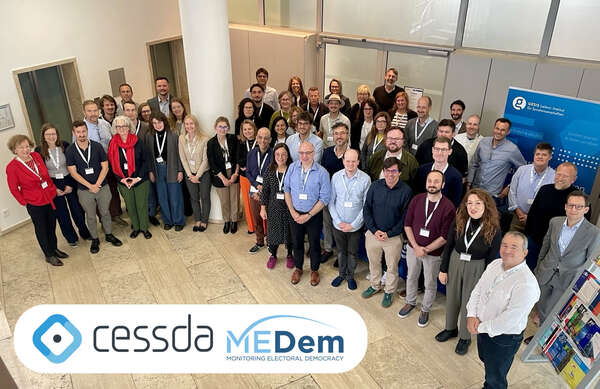
CESSDA Contributes to European Dialogue on Data and Democracy at MEDem Conference 2025
The MEDem Conference 2025, held on 29–30 September at GESIS, Leibniz Institute for the Social Sciences in Cologne, brought together researchers, policymakers, and data journalists to explore the future of evidence-based democracy research.
The conference is a yearly event organised as part of the Monitoring Electoral Democracy (MEDem) infrastructure initiative. The two-day event featured keynote sessions, panel discussions, and tool demonstrations showcasing the latest advances in democratic data infrastructures across Europe.
This year’s conference served as a hub for exchanging ideas on how data can be used to better understand and support democratic processes, with a strong emphasis on collaboration, data interoperability, and infrastructure development. Among the attendees was CESSDA Director Bonnie Wolff-Boenisch, underscoring CESSDA’s engagement in European efforts to promote accessible, high-quality research data for democracy studies. CLARIN was also represented by Prof. Franciska de Jong, who supports MEDem’s efforts to work with textual data. The GESIS president Prof. Christof Wolf talked of the importance of the interoperability of survey and textual data.
MEDem has submitted an application for the upcoming ESFRI Roadmap. The conferences are a way to bring the community together and discuss their needs. In her keynote speech, Prof. Sarah de Lange highlighted the need to research the processes that connect elites and citizens so we gain a better understanding of their interactions. The keynote speech of Simon Munzert focused on the wealth of data produced around every election and the tools needed to bring them all together to offer a better overview of public opinion and its ebbs and flows.
CESSDA Director Bonnie Wolff-Boenish attended the conference, and emphasized the importance of cross-domain cooperation:
“International collaboration is essential for understanding the health of democracies and the challenges they face. By bringing together social scientists, data specialists, and media researchers, initiatives like MEDem create the conditions for real innovation.”
Beyond the presentations and panel discussions, the event highlighted the growing maturity of MEDem as a pan-European infrastructure. By connecting initiatives such as CESSDA, CLARIN, and GESIS, MEDem is shaping a shared space for democratic data that transcends disciplinary and national boundaries. The 2025 conference laid the foundation for a more connected and resilient European research ecosystem.